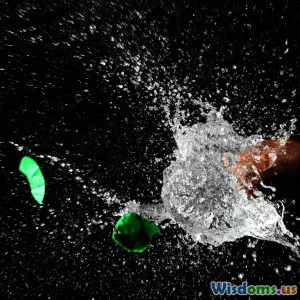
Comparing Youth vs Professional Sports Ethics Worldwide
13 min read Explore the distinct ethical landscapes shaping youth and professional sports globally and their profound impacts on players and society. (0 Reviews)
Comparing Youth vs Professional Sports Ethics Worldwide
Sports unite diverse cultures, inspire exceptional performance, and foster community spirit worldwide. Yet beneath the surface lies a complex web of ethical considerations that differ strikingly between youth and professional levels. Exploring these contrasting ethics offers revealing insights—spanning ideals, rules, pressures, and consequences—that shape not only athletic performance but also individual character and societal values.
Introduction
From the grassroots where children lace up their first cleats to colossal stadiums hosting multimillion-dollar athletes, sports carry deep ethical undercurrents. Youth sports emphasize development, participation, and enjoyment; professional sports often revolve around competition, commercial interests, and spectacle. This duality raises essential questions: How do ethics manifest differently across these realms? What impact do these ethics have on athletes’ well-being and broader cultural perceptions of sports?
Understanding these differences provides coaches, parents, administrators, and fans a critical foundation to advocate for fairer, healthier, and more inclusive athletic environments worldwide.
Foundations of Sports Ethics
Defining Ethics in Sports
Sports ethics examine moral principles guiding behavior in athletic contexts, including fairness, respect, honesty, and responsibility. These principles influence how rules are applied, how competition occurs, and how athletes, officials, and supporters interact.
At their core, sports ethics promote values like:
- Fair Play: Competing honestly without cheating or gamesmanship
- Respect: For opponents, officials, and the game itself
- Inclusion: Providing access regardless of background or ability
- Well-being: Safeguarding physical and mental health
These values cultivate character and social cohesion through sports. However, practice often diverges, especially across different age groups and professional levels.
The Role of Context
Ethical considerations vary dramatically depending on context—cultural, institutional, economic. What may be accepted competitive behavior in one system might be condemned in another. Technologies, media exposure, and globalization further complicate these norms.
Youth Sports Ethics: Values and Challenges
Youth sports prioritize growth over victory, emphasizing participation, learning, and enjoyment. Nonetheless, the ethics of youth sports face ongoing pressures and dilemmas.
Core Ethical Priorities
-
Development and Inclusion: Youth sport programs endeavor to be inclusive and developmentally appropriate. According to the Aspen Institute’s Project Play, fostering lifelong physical literacy supersedes performance outcomes in children.
-
Positive Coaching: Coaches play a pivotal ethical role nurturing skills and character. Principles of positive coaching include encouragement, patience, and modeling integrity.
-
Safety and Health: Protecting young athletes’ physical and psychosocial health is critical. Organizations like the American Academy of Pediatrics push for concussion protocols and age-appropriate training.
Ethical Challenges in Youth Sports
Despite noble aims, youth sports are not immune to ethical pitfalls:
-
Early Specialization and Burnout: Intense competitive focus can lead to physical injury and psychological stress in children. A 2019 study in the Journal of Pediatrics linked early sport specialization to increased overuse injuries.
-
Parental Pressure and Misconduct: Parents sometimes impose unrealistic goals or aggression, compromising ethical standards. Research in the Journal of Sport Behavior reveals that parental misbehavior at youth games is a widespread problem globally.
-
Talent Identification versus Inclusion: Balancing nurturing elite talent with mass participation ignites ethical dilemmas. Selection processes can inadvertently exclude marginalized groups.
-
Win-At-All-Cost Mentality: Even at the youth level, the pressure to win may encourage rule-bending or unsportsmanlike conduct.
Global Examples of Youth Sports Ethics
In Scandinavian countries like Finland, youth sports programs emphasize joy and non-competitiveness, integrating helping behaviors as integral ethical components. Conversely, in countries like Brazil or the USA, youth systems sometimes echo professional sector’s intense competitiveness, leading to early burnout but also greater opportunities.
Professional Sports Ethics: Commercialization and Complexity
Professional sports operate in a commercialized, high-stakes realm where ethics are intensely scrutinized—and often compromised.
Ethical Pillars in Professional Sports
-
Fair Competition: Anti-doping, anti-corruption, and fair play are statutory principles promoted by bodies like the World Anti-Doping Agency (WADA).
-
Athlete Welfare: Contractual fairness, health rights, and post-career support shape ethical debates.
-
Transparency and Governance: Sports federations face mounting demands for accountability to stakeholders and fans.
Key Ethical Dilemmas
-
Doping and Cheating: Specs like the Lance Armstrong scandal reveal the challenges in enforcing anti-doping regimes in a profit-driven atmosphere. Despite rigorous testing, estimates suggest up to 30% of elite athletes have engaged in doping per a 2021 meta-analysis.
-
Commercial Exploitation: The financial stakes tempt owners, sponsors, and agents to prioritize revenue over ethics. Labor disputes and exploitation of young talent from developing countries spotlight inequities.
-
Corruption and Match-Fixing: Global football (soccer) has battled pervasive corruption. In 2023, a blitz by FIFA exposed several officials involved in bribery.
-
Mental Health and Pressure: The psychological toll of professional sports is underscored by athletes like Simone Biles and Naomi Osaka glorifying mental health openness, reshaping ethical treatment of athletes.
Global Perspectives
Different legal, cultural, and economic frameworks influence ethics at the professional level. European soccer clubs may clash ethically with American franchise systems due to differing labor rights structures. Asian markets bring unique sponsorship and celebrity status dimensions.
Comparing Ethical Priorities: Youth vs Professional Sports
| Ethical Dimension | Youth Sports | Professional Sports |
|---|---|---|
| Primary Goal | Development, enjoyment, participation | Competitive success, entertainment, profit |
| Pressure Sources | Parents, coaches, peer comparison | Media, sponsors, financial incentives |
| Fair Play Focus | Learning rules, sportsmanship | Rule enforcement, anti-doping programs |
| Athlete Welfare | Injury prevention, emotional support | Contract rights, long-term health |
| Commercial Influence | Limited, mostly non-commercial | Major driver affecting decisions and behavior |
| Inclusion | Broad, emphasizing access and fairness | Broader talent pool, but inequalities persist |
Insights
While youth sports ethics prioritize personal growth and fairness, professional sports increasingly grapple with reconciling commercial interests and ethical principles. This divergence impacts athlete experiences profoundly.
Impact on Athletes and Society
Youth Athletes
Ethical coaching and supportive environments at a young age promote confidence, teamwork skills, and lifelong health—a foundation for future societal engagement. Conversely, unethical pressures can induce dropout, long-term trauma, or disillusionment.
Professional Athletes
Ethical failings compromise athlete dignity and well-being, risk-prone health, and public trust. However, growing ethical awareness, like emphasis on mental health, signals hope.
Broader Social Implications
Sports serve as cultural mirrors. Ethical standards influence societal values around fairness, perseverance, and integrity. The ethics of sport ripple beyond arenas into education, politics, and business innovation.
Moving Forward: Bridging the Ethical Divide
Recommendations for Youth Sports
-
Education for Parents and Coaches: Emphasize ethical leadership and reducing win-at-all-cost mentalities.
-
Safety Protocols: Universal concussion awareness and long-term health monitoring.
-
Inclusive Policies: Active outreach to marginalized communities.
Professional Sports Reforms
-
Stricter Anti-Doping Enforcement: Coordinated global governance with resources for transparency.
-
Athlete-Centric Governance: Empowering player unions to influence health and labor policies.
-
Mental Health Investment: Programs normalized and destigmatized.
-
Ethical Marketing: Align sponsorship with social responsibility.
Conclusion
The ethics shaping youth and professional sports reflect fundamental differences in purpose, pressure, and priorities influenced by age, maturity, and commercialization. Recognizing these distinctions enables stakeholders worldwide to tailor ethical approaches appropriately, fostering integrity and respect at all levels. Only by bridging ethical divides—nurturing children’s joy and protection while holding professionals accountable—can sports truly realize their unique power to inspire and unite humanity globally.
Through global cooperation, education, and commitment, the world can advance sporting ethics that honor the dignity and potential of every athlete—from first-time youth players to revered professionals.
References:
- Aspen Institute, Project Play, 2022 report on youth sports ethics.
- Malina, R. M., et al. (2019). Early sport specialization and its consequences. Journal of Pediatrics.
- World Anti-Doping Agency Annual Report, 2023.
- FIFA Ethics Investigations, 2023.
- American Academy of Pediatrics. (2021). Sports medicine guidelines for youth.
- Gould, D. (2017). Positive Coaching and Athlete Development. Journal of Sport Psychology.
- Interviews with youth coaches from Finland and Brazil (2022-2023).
This article aims to serve as a comprehensive guide for readers seeking to understand and improve sports ethics worldwide.
Rate the Post
User Reviews
Other posts in Sports Ethics & Fair Play
Popular Posts
















